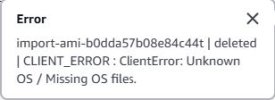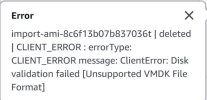Setup / Environment:
o- Proxmox VE 8.3
o- VM on Proxmox running Oracle Linux
o- VM on Proxmox running Windows Server 2022
o- VMs are in .qcow2 format on proxmox (just want to make sure!)
Purpose:
o- Convert the .qcow2 file to a format compatible with AWS's Migration Hub Orchestrator (MHO).
o- MHO supports the following formats: OVA, RAW, VHD, VHDX, and VMDK and perhaps some others.
o- I converted my myvm.qcow2 to a) myvm.vmdk b) myvm.raw c) myvm.vhdx formats (since qemu-img supports .vmdk, .raw, and .vhdx; which are MHO's supported format).
o- However, when importing any of these (myvm.vmdk, myvm.raw, myvm.vhdx), none of them worked and error out.
o- Importing errors are like:
o- <snip> Disk Validation failed <snip> for vhdx format when imprting image with MHO; error image attached
o- <snip> Unknown OS / Missing OS files <snip> for both vmdk and raw imprting images with MHO; error image attached
Attempts & Challenges:
Open Virtualization Format (OVF) Tool:
o- Some forum posts here suggest using the OVF Tool. However, this requires building a template OVF (template.ovf) based on the VM's hardware specs.
The OVF Tool is available for Linux, Windows, and macOS, and while I prefer to install it on Proxmox, I still need a valid myvm.ovf (or simply call template.ovf)
to proceed.
Using TAR Command to Create OVA:
o- I attempted to use the tar command (tar -cvf myvm.ova myvm.ovf myvm.vmdk) to create an OVA. I created a myvm.ovf template, but when importing the resulting
myvm.ova into Oracle VirtualBox, it threw several errors. After three attempts on a POC for myvm.ova, I was unable to get this method to work when trying to
to fix myvm.ovf.
The Goal:
The goal remains to successfully convert myvm.qcow2 into a format that can be used by AWS Migration Hub Orchestrator. I am looking a way, for example take any of the running myvm's configuration file from proxmox (i,e, /etc/pve/qemu-server/myvm.conf or anything like that) and make a ovf (myvm.ovf in this case) file. So that I can tar command (tar -cvf myvm.ova myvm.ovf myvm.vmdk) to gnerate myvm.ova which has no issue importing into AWS's MHO tool. Because of the real vm's size, hard to bring onto a PC to import into first in Oracle VirtualBox as vmdk format and then export as myvm.ova.
Note: All of my transferred files have been verified using md5sum to ensure file integrity and prevent any data corruption.
Has anyone successfully exported VMs from Proxmox and imported them into AWS using the Migration Hub Orchestrator (MHO) interface?
If so, I would greatly appreciate your guidance. Thank you for taking the time to read through this long thread, and I appreciate any help you can provide.
o- Proxmox VE 8.3
o- VM on Proxmox running Oracle Linux
o- VM on Proxmox running Windows Server 2022
o- VMs are in .qcow2 format on proxmox (just want to make sure!)
Purpose:
o- Convert the .qcow2 file to a format compatible with AWS's Migration Hub Orchestrator (MHO).
o- MHO supports the following formats: OVA, RAW, VHD, VHDX, and VMDK and perhaps some others.
o- I converted my myvm.qcow2 to a) myvm.vmdk b) myvm.raw c) myvm.vhdx formats (since qemu-img supports .vmdk, .raw, and .vhdx; which are MHO's supported format).
o- However, when importing any of these (myvm.vmdk, myvm.raw, myvm.vhdx), none of them worked and error out.
o- Importing errors are like:
o- <snip> Disk Validation failed <snip> for vhdx format when imprting image with MHO; error image attached
o- <snip> Unknown OS / Missing OS files <snip> for both vmdk and raw imprting images with MHO; error image attached
Attempts & Challenges:
Open Virtualization Format (OVF) Tool:
o- Some forum posts here suggest using the OVF Tool. However, this requires building a template OVF (template.ovf) based on the VM's hardware specs.
The OVF Tool is available for Linux, Windows, and macOS, and while I prefer to install it on Proxmox, I still need a valid myvm.ovf (or simply call template.ovf)
to proceed.
Using TAR Command to Create OVA:
o- I attempted to use the tar command (tar -cvf myvm.ova myvm.ovf myvm.vmdk) to create an OVA. I created a myvm.ovf template, but when importing the resulting
myvm.ova into Oracle VirtualBox, it threw several errors. After three attempts on a POC for myvm.ova, I was unable to get this method to work when trying to
to fix myvm.ovf.
The Goal:
The goal remains to successfully convert myvm.qcow2 into a format that can be used by AWS Migration Hub Orchestrator. I am looking a way, for example take any of the running myvm's configuration file from proxmox (i,e, /etc/pve/qemu-server/myvm.conf or anything like that) and make a ovf (myvm.ovf in this case) file. So that I can tar command (tar -cvf myvm.ova myvm.ovf myvm.vmdk) to gnerate myvm.ova which has no issue importing into AWS's MHO tool. Because of the real vm's size, hard to bring onto a PC to import into first in Oracle VirtualBox as vmdk format and then export as myvm.ova.
Note: All of my transferred files have been verified using md5sum to ensure file integrity and prevent any data corruption.
Has anyone successfully exported VMs from Proxmox and imported them into AWS using the Migration Hub Orchestrator (MHO) interface?
If so, I would greatly appreciate your guidance. Thank you for taking the time to read through this long thread, and I appreciate any help you can provide.
Attachments
Last edited:



